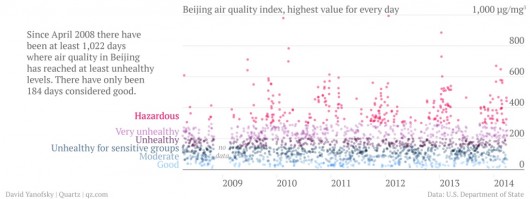
Forget human rights, which will not, I promise you, get the man on the 5F dancefloor to lose his groove. Forget censorship, because who cares about cultural emasculation? Forget Zhou Yongkang, school stabbings, Diaoyu Islands, corruption, Sichuan earthquakes, shoddy construction. Take a lesson from the New York Times when it wants to link-bait: head over to the US embassy’s Beijing air Twitter account and report the latest AQI, because nothing — absolutely nothing — unites the English-reading populace of China quite like bad air.
Knowing this, maybe the US embassy has done all of us a favor by posting Beijing air quality data dating back to 2008. Quartz has helpfully put it in an eye-catching chart, above. “Scary” chart, reads the headline. Feel scared, Beijingers? If only there were a way to leave.
Listen: all sympathy for you if your children live here and you’re legitimately concerned about their health. And if you’re making money off others’ fears, whether selling filters or jars of French air, more power to you. I’m not saying bad air is good. But what is it we hope to accomplish by complaining on our Facebook feeds? To make friends and family back home rubberneck at all our woe? Or to feel special? Do we think our voices will compel officials to do “something,” or “more,” as if their children live under a different sky and they remain blissfully ignorant of or unaffected by PM2.5? (Okay, actually — sometimes the children of rich people do have other options.) AQI obsession has gotten a bit cliched, no?
I think the answer is we — you, me, guvs, squids, the rest — have nothing else in common. We’re from too many different countries, to say nothing of cultures, and we need this to feel connected to, I don’t know, each other? We need something to agree upon and nod our heads to, because Xi Jinping falls short of the Great Uniter standard. I’m not going to take pollution away from you.
I just want to say I’m tired of seeing your AQI retweets.
If you think I’m being harsh, consider: traditional media routinely, flippantly compares living in Beijing to a nuclear winter. Seriously: a barren, gray hellscape caused by a force rivaling the explosion of stars resulting in death, destruction, and decay. That’s where we’re living. Tell that to the young lady sipping her Cosmopolitan in the hutong bar.
Where do you go talking sensibly about a subject after you’ve burned your last hyperbole?
Lily Kuo, author of the Quartz article, gives us this little sane tidbit to think about:
At the same time, the embassy’s motivations for publicizing the data in Beijing have been questioned. China’s bad air quality has been a source of international criticism, derision, and discontent at home. In contrast, the US embassy in New Delhi does not widely publish its air quality measures, despite air pollution that has hit levels twice as high as Beijing’s for several winters running and much lower public awareness of the problem.
Air quality is a problem in both capital cities, but perhaps the difference is their relationship with the US: India has long been a diplomatic ally, but China is increasingly seen as something of an economic rival.
Whether you believe it or not, it’s sure more interesting to ponder than “air is bad.”

















































I started experiencing minor respiratory issues after a few months of arriving in China. Back in my own country I was an avid runner who had no problems running half marathons. The air is bad in China, but lucky for me I can leave. My Chinese friends deserve better. India’s bad air, and the US bias against China does not change the situation in China. If people don’t complain, there won’t be any pressure to change things. I say keep the retweets going until the air quality catches up with the US.
A fair point; probably the food is a more urgent health risk anyway.
That said, though, the New Delhi comparison is probably misleading. Even back in 1999, Beijing had TEN TIMES as many Americans as New Delhi and I’m sure that gap has only grown wider since. Is it really any surprise that the Beijing embassy would offer more services? Ulaanbataar has terrible air, too, but I’m guessing the embassy there doesn’t live-tweet pollution data either.
People forget that China is in the middle of its Industrial Revolution.
Ask historians how bad the air was in places like London or Pittsburgh when England and the USA were industrializing…it was just as bad, if not worse.
Care to back that up? any sort of actual information would be nice.
In some parts of London contemporary sources noted how sometimes trees would be covered in soot from factories, and how many working class women had to work with sulphur on their bare skins in match factories. Don’t forget the use of child labour with the English campaigned so hard against to prevent industrialists from using it in the future.
Indeed, but back in the days, the technology was not as advanced as today, and health risks linked to pollution weren’t as widely studied as today.
It is like saying that most of the US have been built using slaves, so it is ok for China to use slaves.
New century, new state, new ways to develop
Why’d you say SmartAir is “making money off others’ fears?” They are doing a great thing by reducing the cost of a typical air filtration machine by 1000%. They even say they sell their filters at factory price. I’m pretty sure that it is a social enterprise and not a for-profit company.